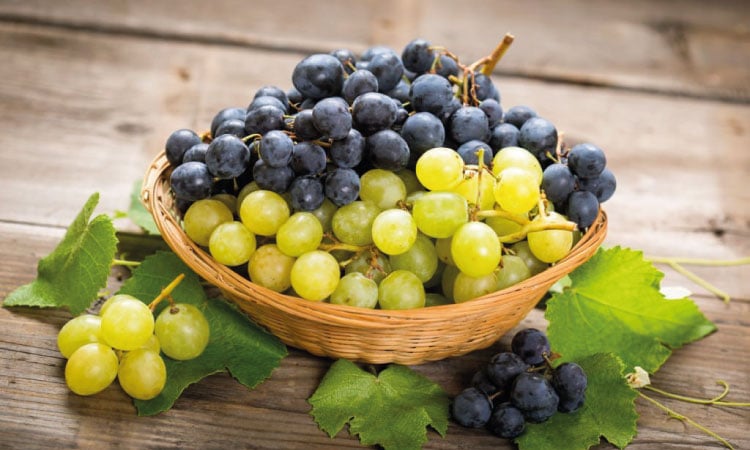Grapes are one of the easily available fruits and are also amongst the tastiest and the healthiest fruit loved by all. Grapes are also accepted for their health benefits associated with fertility and prosperity. They come in different colors – green, red, black, white (light green) yellow, pink and purple. Though they are tasteful, how about offering grapes to babies?
Grapes grow in clusters and can be seeded or deseeded. They can be eaten raw or made as jams, jellies, raisins, and grape seed oil. Apart from this, grape seeds also have numerous health benefits and are used for manufacturing skin care products.
Grapes being one of the most savored fruits, this article will help you understand all you need to know about offering grapes to babies.
Are Grapes Safe For Babies?
Grapes for babies are considered safe foods and can be introduced after nine months — once the baby is ready to eat solids. Offering grapes to babies needs certain precautions. Grapes need to be sliced into quarters and offered to kids as they are one of the foods that are of a great choking hazard.
You can offer grapes to babies by incorporating them into sweet and savory dishes. Babies can be given seedless grapes in the form of puree or mashed form — in case you plan to introduce them from the sixth month. If you plan to introduce them as finger food, you can start right from the ninth month.
Related Reading: 15 Easy To Make Finger Foods for Babies With No Teeth
Grapes can also be offered to kids in the form of juice as the fibers in grape juice helps with the baby’s digestive system. Grapes are also rich in vitamin B, vitamin C, and vitamin K which help with the baby’s growth.
Nutritional Value Of Grapes
Grapes contain most of the nutrients that are essential for children, making them a must-eat for babies. Grapes are also rich in potassium, fiber, and a wide range of vitamins and minerals. Grapes for babies come with antioxidants. It also has high amounts of phytonutrient resveratrol — which is good for the heart.
Being a rich source of vitamin K, vitamin B, fiber, and copper adding grapes to your child’s diet provides significant benefits. Grapes for babies are also completely free of cholesterol causing no damage to their blood vessels. This fruit is also a great source of vitamin C. Since they are full of water, they can also keep your child hydrated.
Grapes for babies are recommended as they are low in fat and less in calories. Though grapes are a nutrient-dense source of carbohydrates, they provide minimal amounts of protein and fat.
According to a source, below is the nutritional value of grapes.
- Calories: 62
- Fat: 0.3g
- Sodium: 2mg
- Carbohydrates: 16g
- Fiber: 1g
- Sugars: 15g
- Protein: 0.6g
- Vitamin C: 3.68mg
- Vitamin K: 13.4mcg
- Vitamin A: 4.6mcg
When Can We Introduce Grapes To Baby?

Grapes for babies can be technically offered once they begin to eat solid foods. However, to be on the safer side, it is better to offer beyond nine months as grapes are a choking hazard. Grapes must be sliced into quarters and offered with care as it could be challenging for the baby to eat them.
Grapes are one rich fruit that can be offered to babies to ease their constipation issues due to their water and fiber content. For babies, it is recommended to deseed the grapes and make the grapes flesh into a pulp, and offer it as a puree. For children over one year, you can offer grape juice which is also a healthy option. Grapes in the form of raisins can also be offered to children. You can soak the raisins overnight and feed the baby to tackle constipation issues.
Related Reading: 15 Foods That Can Cause Constipation In Toddlers
Health Benefits Of Introducing Grapes To Your Baby’s Diet
Grapes — a mix of sweet and sour flavor is fully rich in vitamin C and vitamin K. Grapes also contain fiber which is good for your baby’s gut health. Grapes are a low-calorie food that comes with 80% water content. You may offer your little one purple or green grapes without any seeds. It is better to taste the fruit to check whether they are sweet or sour before offering it to the baby.
Every fruit comes with essential nutrients required for the body. So do grapes for babies. The nutrients available in grapes make the health benefits of fruit unquestionable and something that need not be missed.
Besides being a sour fruit, grapes for babies have some health benefits like:
1. Increases immunity
Apart from assisting with their overall growth and development, the vitamin C content in grapes for babies also aids to improve the child’s immunity. Vitamin C is an important nutrient that is essential for the optimal health of your child. Grapes also contain antioxidants that safeguard from damaging the baby’s body cells.
Vitamin C also helps in enhancing iron absorption and producing collagen — a protein in the human body. Though breast milk and formula milk come with good sources of vitamin C, if you are concerned that your baby isn’t getting enough vitamin C you can make grapes as a part of their diet.
2. Makes respiratory system healthier
Consuming grapes can be beneficial for the baby’s respiratory organs. Respiratory problems such as bronchitis or asthma is a common occurrence in the childhood phase. By regularly offering grapes to babies, the risk of developing respiratory health conditions can be reduced.
Since grapes are a good source of antioxidants, they also help in improving the breathing quality. Also, resveratrol — an anti-inflammatory property of the fruit helps relieve allergy symptoms and improve airway health.
3. Good for baby’s digestive health
Constipation in babies is one of the most common digestive issues once they are introduced to solid foods. Grapes are rich in fiber. Including grapes for babies as a part of their diet could ease constipation and digestive issues.
Also, the water content is high in grapes which helps the bowel movements, thereby easing stomach-related issues.
Related Reading: How And When To Use Apple Juice For Baby Constipation (Till 2 Years)
4. Contains a good amount of vitamins
Vitamins play a crucial role in the baby’s growth and development. Grapes are a good source of vitamin K and vitamin C supporting the overall growth and development and also in the growth of the body tissues. Also, grapes are a good source of calcium. Offering grapes to babies as finger food from nine months helps to strengthen their bones and teeth.
5. Makes heart healthier
Since grapes are rich in antioxidants, they help in supporting the proper functioning of the heart as well as ward off free radicals. It also contains flavonoids — which protect the overall heart and save against “bad” cholesterol.
How To Select And Store And Serve Grapes For Baby Food

Giving the best for our children is what we parents look for. And when it comes to offering grapes for babies, there are many things to be cautious of, as grapes are one fruit that can be rotten easily as well as deceive us skillfully. A few tips are listed below on how to select and store grapes.
- Grapes like many other fruits are delicate due to their thin skin. Make sure to consume it immediately or after a day or two of purchase
- The longer you keep, the more damaged and bruised they become
- While purchasing grapes for babies, try to go with red grapes if possible
- The color of the grapes indicates how better it is. The darker it looks, it indicates the greater amount of antioxidants
- The color of the grapes is also a sign that the grapes will be sweeter. In case you prefer to buy green (white) grapes, then look for grapes with a yellowish tinge
- While offering grapes for babies, always choose seedless grapes
- After you purchase grapes, remember to store them in the fridge without washing. Washing and storing grapes before use will rot more quickly
- Avoid overripe bunches of grapes as they don’t last long. You can check the ripeness by seeing if the grapes are attached to the stems. They are overripe in case you find them dropping from the stem easily
Related Reading: When Can I Give Dry Fruits To My Baby
Grapes are often served to babies as finger foods. There are also many ways in which it could be incorporated as a part of everyday homemade food recipes. Few tips on serving grapes to babies are listed below.
- Due to their size and shape, grapes are a potential choking hazard. Hence, they need to be sliced into quarters before offering it to the child
- Since the skin of the fruit could make the baby gag, it is advised to peel them
- You may offer grape juice to your little one by blending them into the food processor. In case you want a fine texture, you may strain it
- You may add pieces of grapes to the everyday curry which gives them a sweet and spicy flavor
- Yogurt for babies can be made by adding chopped grapes which could be a nutritious dessert for your child
- To offer grapes for babies 9-12 months, cut the grapes in half, then in quarters. The small pieces will be easy for the baby to pick and eat
- For babies between one and two years, the grapes can be cut vertically into pieces and offered under observation
- Kids over age 2 years, can be offered halved grapes that are cut vertically. Horizontal grapes pose a choking hazard
- Kids over age 4 years, should be able to chew whole grapes well. Make sure they sit in a chair and consume, as the slippery food could always be a threat
Related Reading: 10 Safety Rules To Teach Your Kids At Home
Precautions When Feeding Grapes To Babies

Following are some precautions you need to take while offering grapes to babies.
- Grapes are one food that contains a lot of pesticide residue. Hence make sure you purchase grapes for babies from a reputed store
- Start by offering peeled and seedless grapes in pureed forms by mashing them
- Remember to peel the skin and offer only deseeded grapes
- Follow the three-day wait period to rule out intolerance if any
- If your baby doesn’t feel comfortable after consuming grapes, allow a break and resume after a few days
- Though chances for allergy from grapes are rare, there is a possibility it might occur. Watch out for signs such as itching or swelling of the mouth, face, throat, lip, and tongue
- If you are offering seeded varieties of grapes to babies, remove their seeds and thinly slice them vertically to avoid choking
- If your child has expertise eating grapes, make them eat the grapes with their skin to enjoy their benefits fully
- Make sure the child is sitting down when eating grapes

